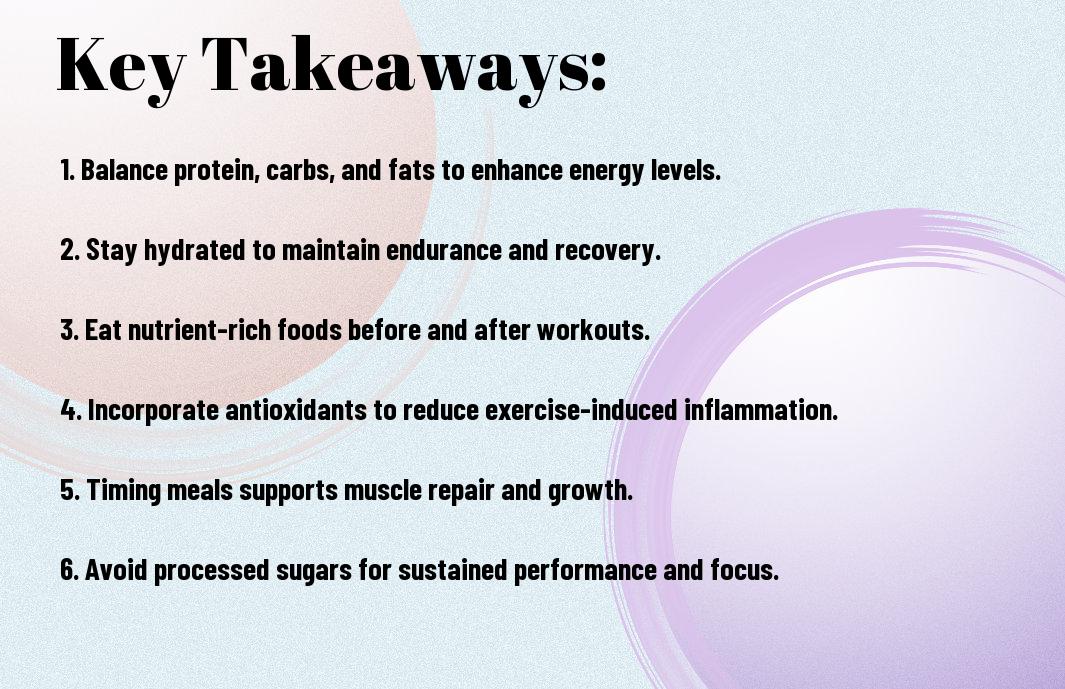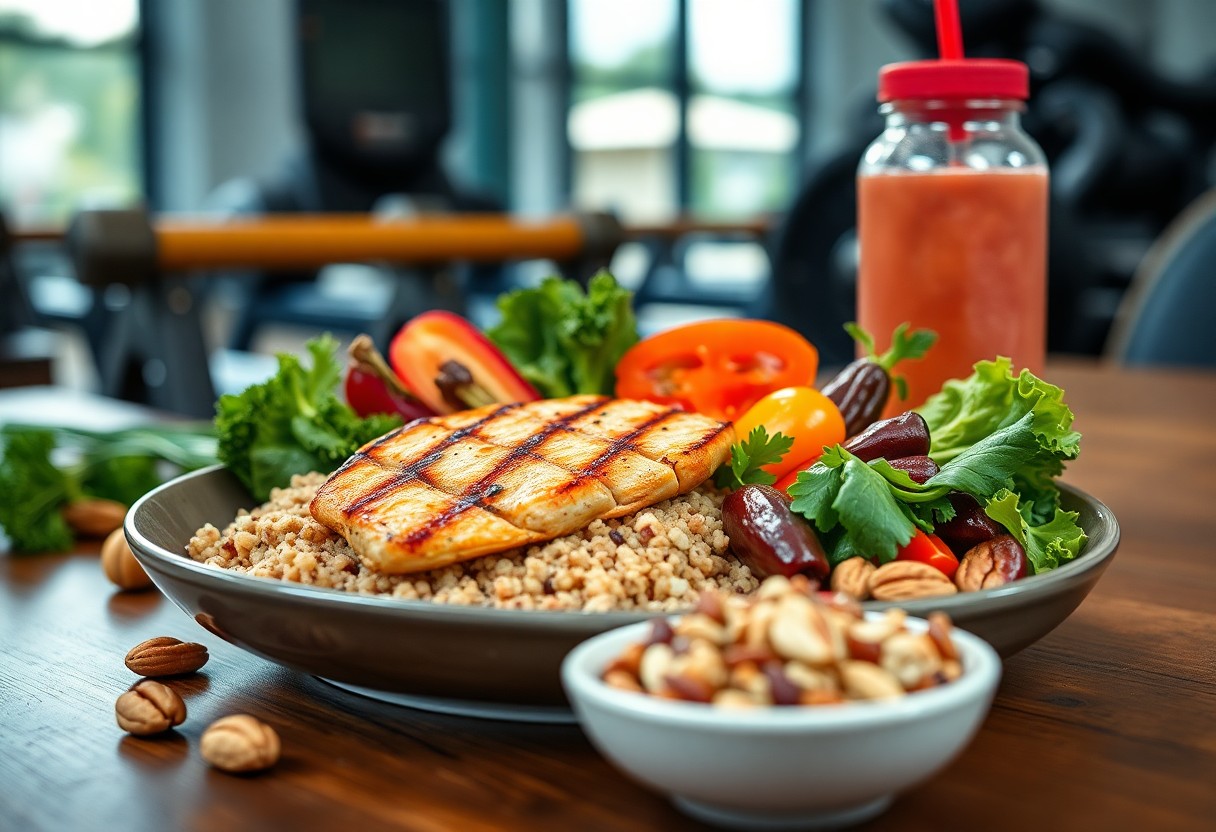Subscription required
There’s more to achieving your fitness goals than just consistent workouts—you need to fuel your body with the right nutrients to maximize performance and recovery. Understanding how to balance carbohydrates, proteins, fats, and hydration can elevate your energy levels and endurance during exercise. By optimizing your nutrition, you support muscle growth, enhance stamina, and reduce the risk of injury. In this guide, you’ll discover practical nutrition strategies tailored to help you perform at your best and maintain a healthy, sustainable fitness routine.
Key Takeaways:
- Balanced macronutrient intake, including carbohydrates, proteins, and fats, supports sustained energy and muscle recovery.
- Hydration plays a vital role in maintaining performance and preventing fatigue during workouts.
- Timing meals and snacks around exercise helps optimize energy levels and enhances overall workout effectiveness.

Understanding Macronutrients
Your body depends on macronutrients—carbohydrates, proteins, and fats—to perform at its best. Each macronutrient plays a unique role in fueling your workouts, repairing your muscles, and sustaining your energy levels throughout the day. Knowing how to balance these elements helps you optimize your performance and recovery, supporting your fitness goals effectively.
Carbohydrates for Energy
Energy from carbohydrates is the foundation of your athletic performance. Your muscles rely on glycogen, stored from carbs, as their primary fuel source during both high-intensity and endurance exercise. Consuming adequate carbohydrates ensures you have enough readily available energy to maintain stamina and power through your workouts.
Proteins for Muscle Repair
Carbohydrates support energy needs, but protein is necessary for repairing and building muscle tissue after exercise. Your muscles undergo small tears during workouts, and protein provides the amino acids needed to rebuild stronger fibers, aiding recovery and growth in response to physical stress.
Plus, including quality protein in your diet helps regulate various bodily functions and supports your immune system, which is especially important as you increase training intensity. Timing your protein intake around your workouts can further enhance muscle synthesis and overall performance.
Fats for Endurance
Below the surface, fats serve as a dense energy source, especially during prolonged, moderate-intensity activities. They help sustain endurance by providing a steady supply of fuel when your carbohydrate stores start to run low, supporting longer workout sessions and overall energy balance.
Due to their role in hormone production and cellular health, fats also contribute to maintaining optimal body functions that influence your fitness levels. Including healthy fats such as omega-3s promotes cardiovascular health and aids in reducing inflammation, both vital for endurance and recovery.
Vitamins and Minerals
Any athlete aiming to enhance performance must prioritize vitamins and minerals in their nutrition. These micronutrients support energy production, muscle function, and recovery processes, helping you train harder and recover faster. Balancing your diet with a variety of nutrient-rich foods ensures you get the necessary vitamins and minerals that work synergistically to optimize your athletic output and overall health.
Key Vitamins for Athletes
Among the necessary vitamins, B-complex vitamins are vital for energy metabolism and reducing fatigue. Vitamin D supports bone health and immune function, helping you stay resilient. Vitamin C aids in tissue repair and antioxidant defense. Ensuring you get adequate amounts of these vitamins can improve your stamina and accelerate recovery, allowing you to maintain peak performance during intense training sessions.
Essential Minerals for Performance
An optimal intake of minerals like iron, calcium, magnesium, and zinc significantly impacts your athletic abilities. Iron facilitates oxygen transport in your blood, boosting endurance, while calcium and magnesium are key for muscle contraction and relaxation. Zinc supports immune health and tissue repair, all of which contribute to improved exercise capacity and recovery.
Minerals must be consumed in balance, as deficiencies or excesses can impair your performance or lead to injury. Tailoring your diet or supplementation plan to your specific needs ensures that your muscles, bones, and metabolism function efficiently. Regular monitoring can help you adjust your intake and maintain mineral levels that enhance strength, endurance, and overall athletic output.

Hydration Strategies
Once again, maintaining proper hydration is a key element in maximizing your workout results. You need to consistently drink fluids before, during, and after exercise to sustain your energy levels and support muscle function. Being proactive about hydration helps prevent fatigue, enhances concentration, and supports overall recovery. Make it a habit to carry water or an electrolyte beverage to stay refreshed throughout your fitness routine.
Importance of Hydration
Before you begin any physical activity, it’s vital to ensure you’re well-hydrated. Proper hydration regulates your body temperature, lubricates joints, and assists in transporting nutrients necessary for your muscles’ optimal performance. When you’re adequately hydrated, you reduce the risk of cramps and overheating, which can impair your ability to perform at your best during exercise.
Electrolytes and Performance
Against the backdrop of intense workouts, replenishing electrolytes becomes necessary to maintain your fluid balance and nerve function. Electrolytes like sodium, potassium, and magnesium play important roles in muscle contraction and preventing dehydration during prolonged physical activity. Incorporating electrolyte-rich drinks or snacks helps you sustain performance and enables quicker recovery.
To fully benefit from electrolytes, you should tailor your intake based on the duration and intensity of your exercise. For shorter sessions, water might suffice, but for longer or more demanding workouts, supplementing with a balanced electrolyte solution ensures your muscles continue to perform efficiently and that you’re replenishing what sweat has depleted. This strategic approach supports endurance and helps avoid fatigue-related setbacks.
Timing Your Nutrition
To maximize your fitness results, timing your nutrition around your workouts is crucial. When you consume the right foods at the right times, you provide your body with the fuel it needs for energy, endurance, and muscle repair. Proper nutrient timing enhances performance, promotes recovery, and helps you achieve your optimal physical goals efficiently.
Pre-Workout Nutrition Tips
Around 30 to 60 minutes before you exercise, focusing on easily digestible carbohydrates with a moderate amount of protein can boost your energy and stamina. Consider options such as:
- A banana with a small spoonful of peanut butter
- Greek yogurt with berries
- A slice of whole-grain toast with honey
- A smoothie containing fruit and protein powder
After consuming these nutrients, you’ll be better prepared to sustain your workout intensity without feeling sluggish or hungry.
Post-Workout Recovery Meals
Your post-workout meal is an opportunity to replenish glycogen stores and repair muscle tissue. Aim to consume protein combined with carbohydrates within 30 to 60 minutes after exercising. Good examples include grilled chicken with quinoa, a protein shake with fruit, or a veggie omelet with whole-grain toast. This approach accelerates recovery and helps you prepare for your next training session.
Indeed, consistent post-workout nutrition supports muscle growth, reduces soreness, and helps maintain your energy levels throughout the day. Tailoring your meals to your workout intensity and duration ensures you consistently perform at your best while minimizing fatigue and injury risks.
Supplements: Do You Need Them?
Not every fitness enthusiast requires supplements to meet their nutritional goals. While some supplements can support your performance and recovery, they should complement a balanced diet, not replace it. It’s important to assess your individual needs, lifestyle, and goals before introducing supplements into your routine. Consulting with a healthcare professional or a registered dietitian can help determine if supplements are a beneficial addition for you.
Common Supplements for Athletes
Among the popular supplements used by athletes, protein powders, creatine, branched-chain amino acids (BCAAs), and omega-3 fatty acids stand out. These supplements can aid muscle repair, enhance energy, and reduce inflammation. However, their effectiveness depends on your training intensity and dietary intake. You should focus on sourcing high-quality products and follow recommended dosages to gain the most benefit.
Risks and Benefits of Supplementation
An informed understanding of the risks and benefits is necessary before including supplements in your fitness plan. While many supplements offer potential performance and recovery enhancements, they may also pose risks such as allergic reactions, contamination, or interactions with medications. Proper research and professional advice will help you navigate these factors safely.
Even though supplements can provide advantages, relying heavily on them without adequate whole-food nutrition might hinder your progress. Overconsumption can lead to nutrient imbalances or health issues. You should prioritize a nutrient-dense diet and use supplements to address specific deficiencies or performance needs, ensuring safe and effective results.
Developing a Personalized Nutrition Plan
Now that you understand the basics of nutrition, it’s important to tailor your diet to match your individual fitness needs. A personalized nutrition plan aligns your food intake with your body’s demands, activity levels, and health objectives. By focusing on what you consume, you can enhance energy, recovery, and overall performance, ensuring your efforts in the gym translate into real progress.
Assessing Your Fitness Goals
Across various fitness ambitions—whether it’s building muscle, losing weight, or improving endurance—you need to clearly define your goals. This assessment guides your nutritional choices, influencing calorie intake, macronutrient distribution, and meal timing. Understanding what you want to achieve enables you to design a plan that supports consistent advancement without compromising your well-being.
Creating a Balanced Meal Plan
Fitness success hinges on a meal plan that provides the right balance of carbohydrates, proteins, and fats. Emphasizing a variety of whole foods ensures sustained energy and proper muscle repair. You should incorporate nutrient-dense options while adjusting portions to suit your daily caloric needs, supporting both performance and recovery.
Also, within your balanced meal plan, spacing meals and snacks strategically throughout the day helps maintain stable blood sugar levels and keeps your metabolism active. Prioritizing hydration and including micronutrient-rich foods like fruits, vegetables, and healthy fats further optimize your body’s capacity to perform and adapt to your training regimen. Customizing these elements based on personal preferences and lifestyle enhances adherence and long-term results.
Final Words
Following this guide, you can optimize your nutrition to enhance your fitness performance effectively. By focusing on balanced meals, proper hydration, and timely nutrient intake, you support your body’s energy needs and recovery processes. Tailoring your diet to your specific workout routine allows you to maximize strength, endurance, and overall results. Prioritizing these imperative nutrition tips empowers you to train smarter and achieve your fitness goals with greater efficiency and confidence.
FAQ
Q: What types of nutrients should I focus on to enhance my workout performance?
A: For optimal workout performance, it is important to consume a balanced intake of carbohydrates, proteins, and fats. Carbohydrates provide the primary source of energy, especially for high-intensity exercises. Proteins help with muscle repair and growth, while healthy fats support long-lasting energy and overall health. Including a variety of fruits, vegetables, whole grains, lean meats, and healthy fats in your diet can ensure you get a wide range of vitamins and minerals to support your fitness routine.
Q: How does hydration impact athletic performance and recovery?
A: Staying properly hydrated is vital for maintaining energy levels, regulating body temperature, and preventing cramps during exercise. Dehydration can lead to reduced endurance, increased fatigue, and diminished concentration. Drinking water before, during, and after workouts helps replace fluids lost through sweat and assists in muscle recovery. For extended or intense sessions, electrolyte-containing beverages can also be beneficial to restore sodium, potassium, and other necessary minerals.
Q: When is the best time to eat in relation to exercise to maximize benefits?
A: Consuming a meal or snack rich in carbohydrates and some protein about 1 to 3 hours before exercising can provide sustained energy and help reduce muscle breakdown. After your workout, eating protein along with carbohydrates within 30 to 60 minutes supports muscle recovery and replenishes glycogen stores. However, timing can vary depending on individual digestive comfort and the type of activity, so it may be helpful to experiment with different eating schedules to find what works best for your body.





